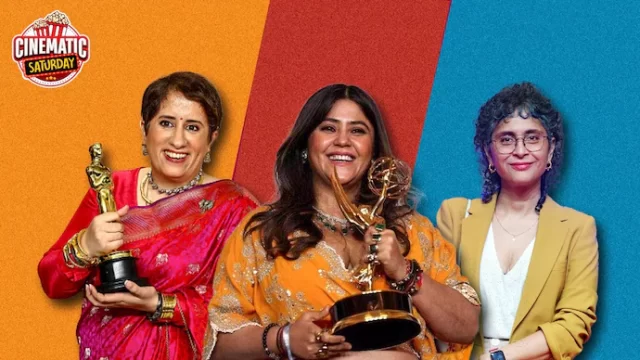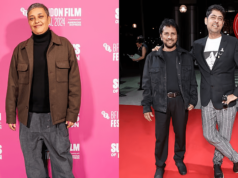The film industry has been male-dominated for decades, but more and more women are paving their way into it and creating space for other women. Guneet Monga, Ekta Kapoor, Kiran Rao, Sarita Tanwar, Jasleen Royal and Modhura Palit decode what it takes to beat gender biases and succeed.
In Short
- Women are taking centre stage in cinema, behind the camera too
- Awards serve as validation and open doors for women in the industry
- A director wore zero-power spectacles just to have her ideas accepted
- Gender biases in the industry exist, but are being challenged by women
Hindi cinema has long been captivated by the magic of its leading ladies. However, in recent years, there has been a significant shift, not just on screen, but also behind the camera. Women are increasingly taking centre stage, not just as actors, but also as directors, choreographers, editors, art directors, and technicians, shaping the narrative and aesthetics of Hindi cinema.
Devika Rani, who is also known as the first lady of Indian cinema, was one of the people to raise the standards of Indian cinema. She was one of the founders of Bombay Talkies, a studio she co-founded with her husband Himanshu Rai in Mumbai in 1934.
She is known for breaking social norms in a number of ways. In 1933, Devika Rani and Himanshu Rai shared India’s first on-screen kiss in Karma, which defied societal norms. Her films targeted social stigmas and featured bold scripts that spoke about the hypocrisy of Indian society. Devika Rani’s projection of female dreams and desires was considered bold for its time.
Not just the production, but she even took care of certain technical aspects of filming that she had learnt. She was also the first recipient of Dadasaheb Phalke Award in 1969.
AWARDS SERVE AS VALIDATION FOR WOMEN IN THE INDUSTRY
Taking inspiration from yesteryear’s female filmmakers, directors like Gauri Shinde, Zoya Akhtar, and Meghna Gulzar are leading the pack today, helming commercially successful and critically acclaimed films that explore diverse themes and redefine storytelling. Moreover, women have now been making the nation proud on the international stage, with Guneet Monga and Kartiki Gonsalves winning the Oscar for their documentary, ‘The Elephant Whisperers’, and Ektaa Kapoor becoming the first Indian to win the International Emmy Directorate Award.
“Awards bring momentum to careers. So, definitely, more doors have opened for us in India and internationally,” Guneet Monga, who heads the production house Sikhya, tells IndiaToday.In. “It’s incredible to have this strength and scale up our slate. We are working harder than before.”
When Ektaa Kapoor received her Emmy nomination, she had announced the news with a note that read, “Overflowing with humility and exhilaration as I receive this recognition. The award holds a cherished spot in my heart, symbolizing a journey that transcends work. Representing my nation globally through this esteemed platform is an honor beyond words. Television has been my compass of self-discovery, especially as a woman crafting tales for women. This accolade empowers me to stand for them and our shared achievements on the global stage (sic).”
Talking about how she created a safe space for women in the television industry, Kapoor said at a FICCI event, “Before we get into gender dynamics, it is just important to know that the commerce of film to television starts from the basic genesis of what story it is. When you tell more stories about women, there are more writers and directors. I’d love to be politically correct and say that every story is gender agnostic, but you sometimes need a female lens for a story and television, I though, created a lot of base for women to find a safe space for work because a lot of their stories were told.”
The next film that Kapoor is producing is ‘The Crew’, which stars three top female actors – Tabu, Kareena Kapoor and Kriti Sanon
However, at the same event, she said how difficult it had been to make films headlined by women and revealed, “I am just making a film called ‘The Crew’ and there was so much love for the promo and I can’t even tell the number of people who asked me that ‘who will watch a film about three women’? This mindset can only change by changing the commerce of it.”
Singer and composer Jasleen Royal also pointed out the importance of winning an award for boosting one’s confidence.
“One empowering experience as a woman in the music industry was when I received recognition for my talent and creativity on my own terms, regardless of gender. This acknowledgement fuelled my confidence and inspired me to continue pushing boundaries in my music composition,” Jasleen Royal told IndiaToday.In.
“Knowing that my voice matters and can make a difference motivates me to keep challenging stereotypes and breaking down barriers for future generations of female composers. I am glad I didn’t succumb to it,” she added.
Cinematographer Modhura Palit also agreed and said that people in the industry started to take her seriously the moment she received an international award. She had received the Pierre Angénieux Excel Lens award at the Cannes Film Festival, the first Indian woman to have ever received the title.
She opines, “It didn’t really make a huge difference in their behaviour towards me, but they started taking me a bit more seriously. It always helps a woman to get a certain accolade. Nobody takes a woman very seriously in their own use or in their own scenarios. So, when someone validates from outside their mindset, of their socio-economic situation, then people take women more seriously. That is very important in today’s world, because nobody is actually willing to give you two seconds of extra time when you are trying to have a point. You have to fight it out to be heard.”
News Credits: India Today










